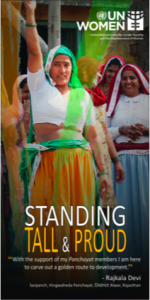Woman Village Head Rajkala Devi: Standing Tall and Proud
Date:

Heads turn in awe and respect as Sarpanch (Village Head) Rajkala Devi walks inside the Panchayat (local village body) office to lead a meeting attended by a large assembly of women from the Hingwada Gram Panchayat in Alwar district of Rajasthan, India.
Rajkala might never have been to a management school, but she manages the needs of the villagers with the ease of a veteran.
She has contested in Panchayat elections twice. In fact, Rajkala is the first woman sarpanch in her village in 60 years. Her historic feat has motivated many women in her village to participate in local politics and speak to men without inhibitions.
Women in the village acknowledge that had it not been her, they would never have entered the Panchayat Bhawan. Now they have no inhibition in speaking even when men are around.
Soon after she came to power, Rajkala ensured that poor families got the “Below Poverty Line ration cards, the local temple was repaired and drinking water was made available.
Besides her participation in the village and block level Panchayat meetings, Rajkala takes education very seriously.
“My focus is on girls' education. I really believe that the village can only be progressive if girls are educated, “ she says. She frequently visits the Anganwadi Centres to ensure that the children get proper meals and that there are adequate teachers.
The need for collective action in addressing issues of critical concern comes out very clearly in interactions with Rajkala, who works hand in hand with the Mahila Jagrook Manch (Women's Awareness Platform) that is supported by UN Women and its partner The Hunger Project.
During these meetings, women leaders regularly update her with the needs of the villagers and also help her to prioritize work. Leadership skills and trainings workshops held through UN Women's programme, funded by the Norwegian Government, have helped her to evolve as a leader.
With the support from her ward members, Rajkala confidently takes issues forward to the district authorities for approval.
“Though I am learning to articulate our needs to the district level functionaries, I am very sure of my priorities, she says. “I want to focus on roads, old age pension, widow pension, benefits for poor families and the education of children. In Rajasthan, members have focused on addressing issues of drinking water, sanitation and education.
To get her proposals approved, she has been to the Block Development Officer's office, Collector's office and the Secretary. She has already put up the proposal of road construction to the minister on his visit to their village.
UN Women and the Hunger Project have now established 315 Jagruk Manches with elected women leaders like Rajkala from 635 Gram Panchayats in Rajasthan, Madhya Pradesh and Odisha. Already the results are showing.
Almost 5000 elected women representatives and over 17,000 women citizens have discussed public schemes and found ways to address domestic violence during Jagruk Manch meetings at gram panchayats (village bodies).
The Manches have proved to be an important support structure for elected women representatives like Rajkala so they can exercise their leadership effectively. At the Panchayat elections in Bihar, there was a marked increase in the number of women canvassing during elections. More and more women contested from general seats, and not just those reserved for them.
“For five years I will stay as Sarpanch and in these five years I will ensure that all women get justice, Rajkala says.
She has already made a small step in the right direction.